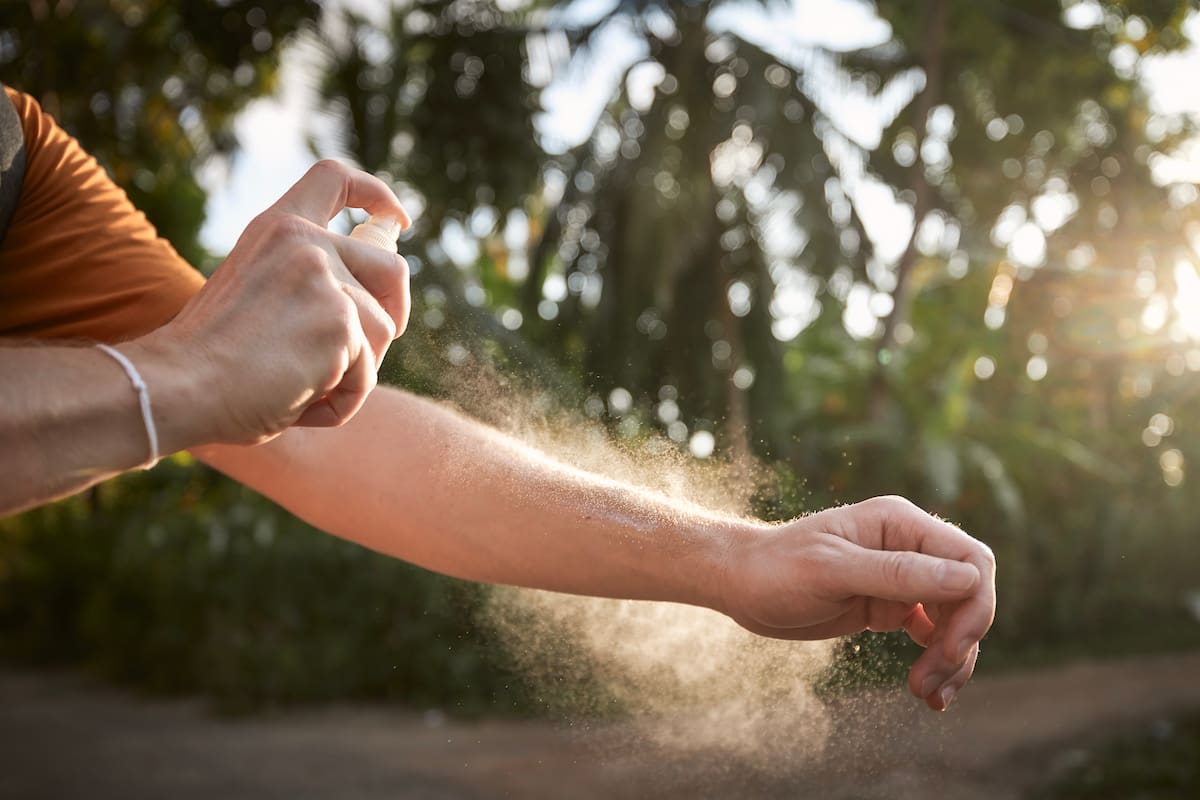Do some people attract mosquitoes more than others? Are all insect repellents created equal? In most parts of Australia, mosquitoes are a minor seasonal inconvenience. In Northern Australia though they can carry dengue fever and in some parts of Australia – rarely – they carry a bacterium which causes a nasty ulcer called the Buruli or Bairnsdale ulcer. In addition, there are some areas of Australia prone to Japanese encephalitis as well as Ross River fever and Murray Valley encephalitis. So mosquitoes are not necessarily benign and with climate change shifting mosquito breeding patterns and their geographical spread, mozzie bites can be more than an inconvenience. “Warmer temperatures and heavy rainfall can increase the mosquito population,” explains the CSIRO’s Principal Research Scientist Dr Prasad Paradkar. The good news is, of 3500 mosquitoes found around the world, only a handful are problematic. “Apart from being annoying and causing itchy bites, most mosquitoes are harmless,” says Dr Paradkar. We asked Dr Paradkar to answer your itchiest questions and put an end to the eternal campfire debate that some people really are mozzie magnets.
Do some people attract mosquitoes more than others?
Picture this: you’re away on a camping trip and everyone has forgotten to bring insect repellent. Your friend sleeps with the screen to their tent open and wakes up without so much as a scratch on him. You however are covered in mosquito bites. How can it happen? Is it possible they like some people more than others? “The short answer is yes. What we do know is that the way we smell is an attractant to mosquitoes,” says Dr Paradkar. “It is likely this is a combination of blood, metabolic by-products, and bacteria on the surface of the skin.”
And it doesn’t end there; some kinds of mosquitoes are actively attracted to body odour. “Lactic acid, which humans release in their sweat is definitely an attractant. Some people produce more of it, and some might be diet related,” says Dr Paradkar. “There are certain species of mosquitoes that love the smell of the bacteria in stinky socks. This includes the dengue fever mosquito which loves biting humans on their ankles.”
Why do mosquito bites feel itchy?
That itch you can’t stop scratching is caused by mozzie spit. “When mosquitoes feed they inject some of their saliva. This can cause an itchy bite mark,” says Dr Paradkar. “Itching is an allergic reaction, so whether a child or adult, in some cases over-the-counter creams containing anti-inflammatory ingredients can help. You should chat to your local pharmacist about what may be best.”
Can you be allergic to mosquito bites?
If you come out in red welts while your friend barely has a bump to show from a mozzie feeding fest, it comes down to your tolerance to mosquito saliva. “Some people are allergic to mosquito saliva so they have a stronger reaction to mosquito bites,” says Dr Paradkar . People can become acclimatised from multiple bites. But this happens more in tropical areas overseas.”
Do mosquitoes favour certain clothing colours over others?
It may sound crazy but it’s true! “Some clothing colours attract mosquitoes more,” confirms Dr Paradkar. “Darker colours such as black basically attract more mosquitoes.”
What is the best way to prevent mosquito bites?
While it may not always be possible, choosing the right time to head outdoors and staying covered up with long pants and sleeves is a good start. “When outdoors, cover wherever possible. Remember, mosquitoes are at their most active and looking for blood around dawn and dusk,” says Dr Paradkar.
In terms of repellents, it pays to check the ingredients. “Use repellents containing DEET, such as Aeroguard, when you go outside. Mosquito coils are also good for keeping mosquitos at bay in an outdoor setting but should not be used in unventilated areas.”
If you’re struggling with mosquitoes inside, it’s all about creating an airflow that they won’t like. “A good old pedestal fan could help – using one of these at night ensures airflows that mosquitoes are unable to fly through,” says Dr Paradkar.
Related Posts
How can I minimise the mosquito population around my home?
The number one thing you can do to keep them in check is to remove any stagnant water. “Mosquitoes don’t need much water to breed, so make sure there are no other potential breeding sites such as pets’ water bowls, bird baths or even pot plant saucers,” says Dr Paradkar. “I also recommend you check your rainwater tanks to make sure they have a good mesh cover on top. The mosquitoes that transmit viruses don’t travel very far, it’s really the local areas around your house that are the key source of mosquitoes.”
Does vitamin B12 or any other supplement help prevent bites?
Unfortunately for those of us who seem to be mosquito magnets, there’s nothing you can take orally that will help ward them off. “There is no supplement or vitamins which have known to prevent mosquito bites,” explains Dr Paradkar.
What ingredients should I look for choosing the most effective mosquito repellent?
Not all repellents are created equal. “Use repellents containing DEET or Picaridin when you go outside,” says Dr Paradkar. “Follow the directions of the product on how often to apply, but remember, it’s dawn and dusk you’ve got to think about.”
Is there any way to protect myself without using a repellent?
Short of staying inside safely behind flyscreens there are few precautions you can take. “The best way to prevent mosquito bites is to wear loose clothing with long-sleeved shirt,” says Dr Paradkar. “Light coloured clothing is less attractive to mosquitoes. Products containing oil of lemon eucalyptus is a natural alternative to repel mosquitoes but remember to always follow the directions of the products when applying.”
Can mosquito bites be deadly?
Worryingly, there are some mozzies that can spread serious diseases. “It’s these deadly mosquitoes that we are targeting with next generation mosquito control,” explains Dr Paradkar. “Invasive species such as the mosquitoes that carry dengue, Zika and chikungunya are increasingly problematic. In Australia, the diseases such as Ross River fever, Japanese encephalitis, Murray Valley encephalitis and Barmah Forest Fever are transmitted by different species of mosquitoes.”
What impact does global warming have on mosquito populations?
Like most things, climate change has an impact on the mosquito population too. “We expect climate change may lead to more mosquitoes globally. As average global temperature increases, mosquito populations will spread to newer areas. In Australia they will move southwards. In the Northern Hemisphere they will move north,” says Dr Paradkar. How mosquitoes adapt to increasing global temperature, and what temperatures are optimal for the transmission of viruses and mosquito lifespan, remains to be seen. “If the change is just a couple of degrees warmer, mosquitoes will be able to adapt really well. But if you go above that to really extreme high temperatures like 35 or 40 degrees Celsius, then it’s too hot for mosquitoes as they will dry out. Parts of Europe have now seen Aedes albopictus mosquito become established. With this species being a transmitter of various viruses, this has raised health concerns.”
Further reading
Stickers and wristbands aren’t a reliable way to prevent mosquito bites. Here’s why
Mosquitoes aren’t repelled by vitamins and other oral supplements you might take


